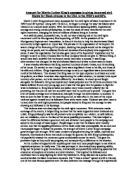This violence was not a bad step for the civil rights movement. With extensive media coverage of the events, it helped King to show that the racist supporters were irrational and unfair. Kings philosophy was for all protests to be completely non-violent, no self-defence, and not retaliation, even in the face of the worst possible provocation. This idea helped to show the difference between good and evil, and attracted more people to the campaign and added to his concept of mass support. People began to see that the blacks were morally correct, and that the appalling behaviour of the racist mobs was unexceptable. So as more and more people began to follow the protests, the strength of Martin Luther King’s campaign grew stronger and stronger. With mass numbers of people attending the rallies, marches and boycotts, they became a force that could no longer be ignored. So with King’s philosophies, the popularity towards the movement grew considerably across the world. This gave the protesters hope as they could see progress, and consequently, a difference to the situation.
As the number of supporters for equality grew more and more people began to see what an inspirational person he really was. This was portrayed in his extraordinary speaking ability. King had the power to grip his audience, dramatically and powerfully delivering speeches that created an atmosphere of emotion and determination. This inspired his followers and motivated them to keep fighting for what they believed in. King was seen as a person who could articulate the black Americans demands. His “I have a dream” speech is still to this day one of the most famous speeches ever. He also delivered his message through his inspirational writings. With examples such as “A letter from a Birmingham Jail”, he managed to draw many peoples attention to the racial problems in his country.
He did not only attract more followers to his SCLC party, but he also joined with groups such as the SNCC and CORE to encourage people to work together. This demonstrates Kings ability to organise, and it paid off. The freedom rides that took place during the 1960’s are a demonstration of how improvements and victories were won. These freedom rides in Birmingham were perfect for King, as he could really exploit the unethical treatment the whites gave the blacks. Through the media, King sent the message across the world that things needed to change in the USA, and slowly but surely, he began to do this. The campaign in Albany was a failure for King as there was minimal media coverage due to a lack in violence. Nobody was interested as it did not shock or draw anyone’s attention. The riots in Birmingham, Alabama were quite the opposite, and King cleverly played on this to his advantage. ‘Bull’ Conner, the Commissioner for public safety was an extreme racist, and wanted to keep segregation enforced at all costs. So when the black protesters reached Birmingham, they were submitted to extreme violence. This was because Conner had purposely failed to organise any protection. However, King used this against Conner, showing the country the scenes through media coverage. Many people were appalled by the images and this created sympathy for the blacks and there causes. So the blacks cleverly gained much support and a changing public opinion on the situation. King also used this tactic in the Selma project, and it proved to be very successful for the campaign.
One of the reasons King churned up so much support was because he was not trying to change the country in the black people’s favour, but to gain equality with the whites. He wanted to try and fit into the white society, integrating blacks and whites so they could be considered the same. Many white people followed the campaign because they did not think this would make too much difference to their living, and it was morally the correct thing to do. King did not only do this through the protesting. He tried to improve living conditions and housing for the poorer black communities, so it would be easier for the white communities to see them as equal. This was more acceptable than the radical idea’s of Malcolm X, who wanted to gain power over the whites, and maintain racial inequality. For this reason, King’s approach obviously gained more support. As a priest, King also used Christianity to show that blacks and whites were equal. Through religion, people could see that there were similarities between the groups, and equality should be created. It also kept the black people in unity, as they got together to pray and maintain hope of victory. King also became friendly with the presidents of the country, this way his message could be demonstrated to everybody. He was more likely to achieve his aims, if he had good relationship with the President, and therefore the country.
King was eventually murdered for his cause, showing that he gave his life for the good of the racist situation. This indicates the passion, determination and courage he used to try and change the racist situation in America. He had dedicated his whole life to the campaign for civil rights, and with the introduction of the Civil rights bill of 1964, he had been successful. With such victories as Selma, Birmingham, and Montgomery, with such tactics as the freedom rides, bus boycott and Sit-ins, and he had made an enormous impact on an unjust society. Along with many natural qualities such as his speeches and writing, he could build up mass support for the campaign, and with inspirational techniques and strategies, he was able to make huge steps towards equality in America….







